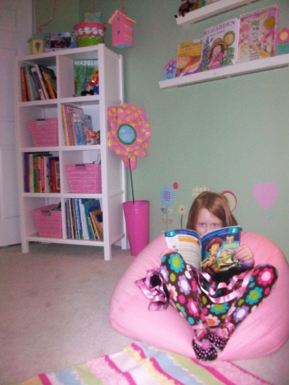By Leslie Lindsay 
If you’ve been reading for awhile now, you’ll know I have two little girls, ages 6 and 8. They are like little sponges, soaking up all of the new stuff they can. And they are ripe for reading.
Just last evening, my 6 year old full-day precocious kindergartner brought home an advanced book, “My teacher says I’m ready, mom. But she also said if it got too hard, I don’t have to read all of it.” I nodded and looked at the book, Fancy Nancy and the 100th Day of School. “Okay,” I said, “We’ll give it a whirl.” We cracked open the book (it literally looked brand-new), and began reading. (image source: Amazon.com 5.7.13)
Now, if you know anything about Fancy Nancy, you’ll know she uses a lot of “big” words. It’s all done in a cute, playful way to improve little vocabularies. Plus, it’s just darn cute to hear your kiddo’s diminuative voice say something like, ‘dilemma,’ and ‘imaginative.’ So, when we came to those big words in the text, we slowed down, we studied the words. We tried to commit them to memory and place a tag on them. Here are some other techniques you can use with your children as they emerge into readers:
- Find words inside of words. Think anagrams. Many words contain smaller words (can is in candle and end is in friend, for example). In the car, or during an evening stroll, ask your kiddos help you look for smaller words within, or “hiding” in words. (be and in inside begin), walk inside crosswalk. You get the idea. If you start seeing words everywhere, you’ll start seeing them in books, too.
- S-T-R-E-T-C-H it out. If your child spots a tough work, suggest she say the sound of each letter. Then, it will be a lot easier to put the sounds together. We do this a lot. I often old my hands out in fists. This fist, (pointing to the right one) contains the word, friend and the other fist (left) contains the word ship. Smash ’em togehter and you get friendship. As you can see, this is particularly great with those long compound words.
- Use Context Clues. Encourage your little one to read an entire sentence before trying to figure out an unknown word. Often, the word will become clear from the rest of the sentence. Give her some practice: write a note for your child. Leave out some letters of a word. Have her think about what the missing word couldbe. Let’s go to the __ __ __K after school (or P__ __ K, whichever you think your child is ready for). When she has it all figured out, help her sound it out and write the word (park).
In case you’re wondering, my little Kelly finished that entire  book on her own, with just a couple of prompts for ‘imaginative,’ ‘dilemma’ and ‘macaroni,’ and then–she read it again!
book on her own, with just a couple of prompts for ‘imaginative,’ ‘dilemma’ and ‘macaroni,’ and then–she read it again!
That’s it–class dismissed!
